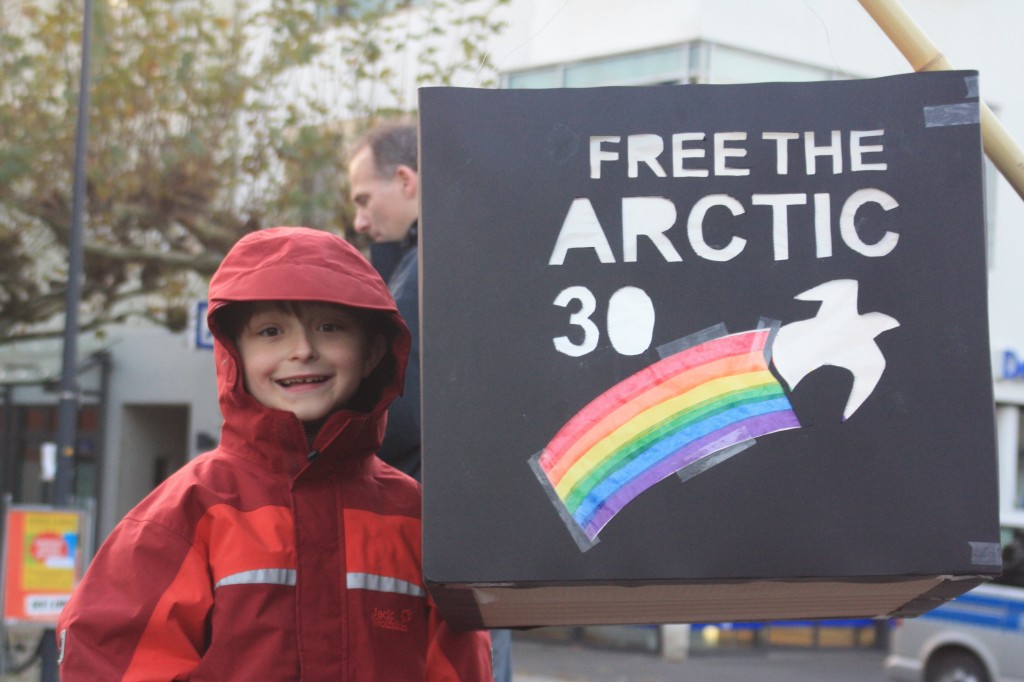Arctic oil: confrontations ahead?
The first oil from the controversial Prirazlomnaya offshore Arctic oil platform is on its way to Rotterdam. This, you will remember, was the oil rig where the Greenpeace “Arctic 30” were arrested by Russian forces last September during a protest. The Greenpeace ship Rainbow Warrior III is on its way to meet the tanker, the “Mikhail Ulyanov”, and protest against Arctic oil drilling. (The Greenpeace icebreaker Arctic Sunrise remains in the custody of the Russian Investigative committee, over six months after the action and four months since an official amnesty was adopted).
This oil transport marks the first ever shipment of Arctic offshore oil. Interestingly, it has been bought by the French oil concern Total SA. I remember the furore when the chief executive of that very company Christophe de Margerie, ruled out drilling in the Arctic in 2012 out of concern about the effect of a possible spill. Hm. Looks like it’s OK to profit from the oil as long as somebody else takes the risk. Although I seem to remember at the time that worry about the negative impact a spill in the sensitive ecosystems of the remote Arctic would have on the image of the industry as a whole played a role in the decision.
Greenpeace Captain Peter Willcox, a member of the ‘Arctic 30’ who was imprisoned in Russia for over two months after the protest at Gazprom’s Prirazlomnaya platform in the Pechora Sea last year, is at the helm of the Rainbow Warrior III. The organization is not saying much about what form the protest will take as yet. But presumably the risks of a drastic response like last year’s Russian crack-down are minimal in the North Sea. As far as the culture of dealing with protest in the Arctic is concerned however, a recent announcement by President Putin gives little reason for optimism. On April 23rd, the Barents Observer carried a worrying report headlined “Putin arms Arctic drillers” on a meeting between Putin and his top national security aides. It says Putin highlighted the need for an enhanced security presence in Russian Arctic territories to protect oil production facilities, loading terminals and pipelines “against terrorists and other potential threats”.
The same day Putin signed amendments in a federal law on the protection of oil and gas objects and infrastructure. It gives Russian oil companies the right to establish their own protection units. The Barents Observer quotes the newspaper Rossiskaya Gazeta as suggesting the companies might eventually hire “thousands of well-armed people, equipped with automatic weapons, vehicles, vessels and aircraft”, mostly former military personnel, police officers and special forces agents. Even if that proves to be slightly exaggerated: the thought of corporate armed units having the law in their own hands to squash anything that looks like opposition to Arctic development is a nightmare.
“This week’s Arctic speech from the Russian leader has a scope which goes far beyond imagined threats from potential terrorists. It also includes a major element of heightened inter-state tensions”, according to the Barents Observer. Given the current climate against the background of the ongoing Ukraine conflict, I have to share that concern. With the Russian leader stepping up the country’s military presence in the Arctic arguing that there is an “increasing conflict of interest between the Arctic coastal states” and that “the situation in the world is fraught with new risks and challenges to Russian national interests”, it is hard to be optimistic about the prospects for an Arctic future free of confrontation.


















Feedback